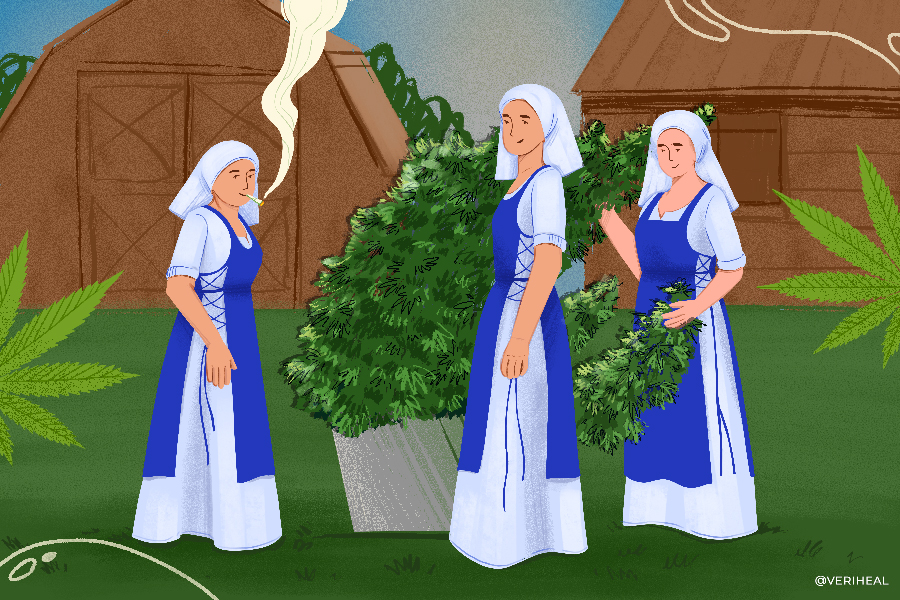Cannabis and nuns are two things that aren’t normally lumped together, but a group of Californian women is changing that.
A nun can be described as “a woman who belongs to a religious order and takes vows of poverty, chastity, and obedience,” reports Catholic Education. A nun’s vows are publicly accepted by religious superiors, and nuns are commonly referred to as “Sister,” “Dame,” or “Mother,” depending on whether they are bound by simple or solemn vows.
Typically, a nun transitions from simple vows to solemn vows, and once the latter have been given publicly and accepted, they live a contemplative life in a monastery, explains Catholic Education. Nuns commit themselves to a particular monastery, forgo private ownership, and pledge celibacy.
It’s no secret that cannabis and religion have historically had a rocky relationship. Many organized religions preach against the consumption of mind-altering substances, including cannabis. Considering this, it’s uncommon—practically nonexistent—to witness nuns associating with the plant. That is until now.
Meet Sister Kate and the ‘Weed Nuns’
According to BBC, the cannabis-growing nuns are not only defying religious beliefs around cannabis but are also praying for profits from growing it. Their land in Merced County in California’s Central Valley looks entirely normal from the outside; there are rows of crops and farmhouses, just as one would expect. A small group of women can be seen walking among the plants as they burn incense, sing hymns, and bless their crops.
These crops are, of course, cannabis. BBC explains that these women call themselves “Sisters of the Valley,” but they are better known as the “Weed Nuns.” A woman named Sister Kate leads this group of women, who are part of “a self-proclaimed enclave of nuns who identify as healers and feminists, but more importantly, business people.” Cannabis aside, these nuns are already breaking norms by involving themselves in business.
While this modern-day, progressive group of women does identify as nuns, it is important to understand that they do not represent an official religion (unlike traditional nuns). Sister Kate told BBC that she believes she has chosen “an industry that is messed up” and that “it’s probably going to be messed up [for the foreseeable future]” and that she is going to “have to do a lot of dancing and sidestepping [in terms of the cannabis industry technicalities and laws].”
Why You Should Get Your Medical Marijuana Card
Veriheal has satisfied millions of patients nationwide by giving them access to these benefits
- Larger purchase limits
- Peace of mind
- Enhanced legal protection
- Access to higher potency strains
- Save up to 25% on cannabis purchases
- Skip the line at the dispensary
A Not-so-Legal Operation
As if this group of nuns wasn’t daring enough, the cannabis being grown on their property isn’t exactly legal—but the crops aren’t being hidden either. In California, the regulations for cannabis cultivation differ from county to county and from city to city. Sister Kate responded to the statement that her crop is being illegally grown by stating, “The sheriffs know that [I grow], they just let me do this.”
She goes on to state that the law enforcers really have “no reason for them to let me [grow weed],” but “I think that they know we will just challenge the law and get it changed then in the county…And I think they know it would be a fight they don’t want to undertake.”
You may be wondering why a group of nuns is growing cannabis and why they would do so illegally, knowing that their operation could get shut down at any moment. BBC explains that there is a farmhouse on the property called “the abbey,” which is where the crops are turned into medicine. Specifically, the nuns produce “super-strength CBD oil” and hemp-based salves. Pre-pandemic, these products earned the enclave $1.2 million a year.
The nuns pray for and bless each batch, but they are currently only making half of their pre-pandemic profits. Some have suggested that the nuns sell their products through licensed dispensaries to try and replenish the lost profits, but doing so would come with a wave of regulations and fees.
California’s Cannabis Tax Problem
While the Weed Nuns’ actions certainly carry a level of risk, they illuminate a much larger problem. California’s hefty state cannabis taxes and regulations make it difficult for cannabis businesses and operations to operate legally. In fact, they’ve been accused of actually making it easier for the illicit cannabis market to thrive. BBC explains that many people are turning to illegal operations as a way into the industry.
According to Joel Rodriguez, a cannabis shop owner in the same area of California, “Dealing with the tax rates as well as having the overheads that black-market dealers don’t have to deal with—rent insurance payroll, just basic stuff like the internet—those kinds of things we have to deal with every day, we can’t write that off, and that all goes into the end cost for the customer.” These barriers ultimately make it more affordable to operate illegally, even with the risk of arrest and/or fines.
The Sisters of the Valley continue to operate in a cannabis gray area, but they hope to one day be welcomed into the legal cannabis industry. “The truth is, I’d love for them to permit us because that would be a win,” said Sister Kate. “And because we believe in paying taxes.”
Author, Share & Comments
















